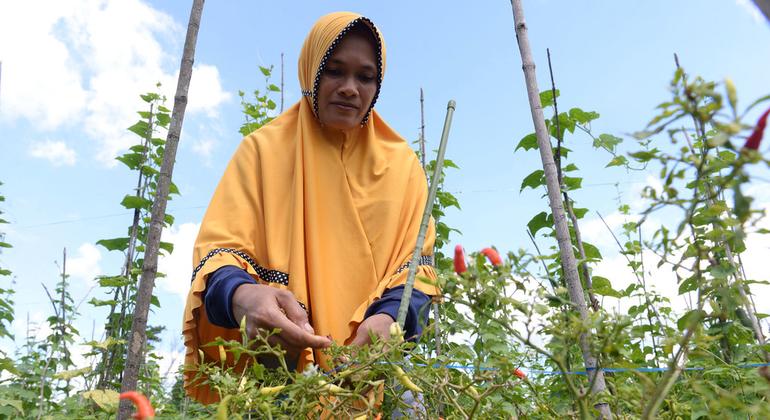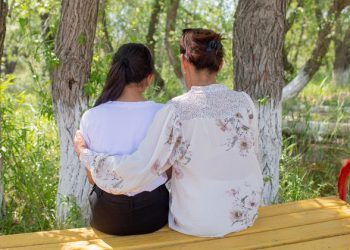Progress is already being made: a school building was saved from burning down; farmers are earning 50 per cent higher incomes; and a healthier peatland is reducing greenhouse gas emissions.
Since its launch in 2019, the programme, which includes training for villagers and critical infrastructure upgrades, has dramatically reduced fire risk and equipped the residents of 121 villages in coastal West Kalimantan with new skills and resources to benefit their communities.
Farming without burning

Cucumbers are harvested in Limbung on the island of Borneo in Indonesia.
“We learned how to work the land without burning the bush and crop residues and in the meantime found ways to grow crops we can sell for more,” said Suprapto, a farmer in the village of Limbung, just south of Pontianak, the provincial capital.
“The training we received made everything so simple,” said Sumi, who heads a women farmers’ group in Jongkat. “Thanks to the market research by BRGM and its partners, we also learned which are the crops we should be growing for cash.”
Limbung and Jongkat are on peatland, wetlands whose soil consists almost entirely of organic matter derived from the remains of dead and decaying plant material. Under certain geological conditions, peat eventually turns into coal.
Like coal seams, peatland stores enormous quantities of carbon dioxide until it catches alight. Fires do not only devastate villages and farmers’ livelihoods, but they also release a substantial amount of carbon dioxide.
Burning bush to clear land and plant residues after harvest led to 245 fires in the district around Limbung in 2021, a staggering number given that a 2009 government decree forbade farmers from burning on peatland. “But without knowing any other methods to farm, we had no other options,” Suprapto explained.
Restored peatland

Eggplants are a delicacy and a cash crop for peatland farmers in Jongkat, West Kalimantan.
Increasing farmers’ options has had a profound impact, helping to reduce the number of fires that broke out last year to just 21.
But, that’s still 21 too many, says Jany Tri Raherjo, who leads BRGM’s operations in Kalimantan and Papua: “We need to reach zero fires and fully restore peatland.”
Thanks to BRGM’s interventions, much of the peatland around Limbung is moist again, enabling farmers to grow vegetables such as cucumber, tomatoes, chili, and eggplants.
“Horticulture really pays off,” Suprapto said. “The income of the villagers that are part of the programme is up by half.”
The additional income, Suprapto said, has in just one year helped families to renovate their houses, buy new motorbikes, and finance their children’s education.
In Jongkat, local farmers identify which crops are best suited to their land and to non-burn farming, with support from BRGM and a non-governmental organisation (NGO) engaged by UNOPS as part of a project funded by the Government of Norway.
Around 20 families received training, on non-burn agriculture and on the use of natural fertilizer, and are now showing the methods to their friends and families in other communities. “There is a joke that it is good to marry someone from Jongkat because you then learn more profitable ways of farming,” Sumi said with a grin.
Blocking canals, retaining water
Training villagers in non-burn farming methods is crucial to making West Kalimantan’s coastal villages more sustainable. Equally important is upgrading irrigation infrastructure to keep rainwater in peatlands.

Canal blockers help to retain water in peatland areas during the dry season, keeping the land moist.
UNOPS provided design and financing for the construction of a few pilot canal blockers – concrete structures that retain water in the canals that crisscross the area, making it available year-round for firefighting and irrigation. Better irrigation prevents the land from cracking, drying out, and decaying, thereby reducing the amount of carbon dioxide released into the atmosphere. Peatland restoration also involves re-vegetation of the area, which in turn keeps the soil moist and decreases the chances of fires and decomposition.
With Government financing and a design based on the UNOPS model, BRGM and its partners have built 179 canal blockers in 27 villages in the area.
“Knowhow from the UN was a great launchpad,” Raharjo said. “We have adapted it to local conditions and improved the designs year after year. We are now rolling out canal blockers that cost about half as much to build as the original.”
Community involvement is key

Volunteer firefighters keep the peatland moist to limit damage if a fire were to break out.
BRGM, with the support of UNOPS, the Ministry of Forestry, and other players, has carried out restoration projects in 852 villages in Kalimantan, Papua, and Sumatra. But, thousands more remain.
“The results are good, but not enough,” Raharjo said.
Community involvement is key to their success at every stage, said Akira Moretto, acting Country Manager at UNOPS Indonesia.
“Policing fires is hard,” he said. “Giving the community a stake in non-burn agriculture is a much more successful way of protecting peatlands and fighting climate change while improving livelihoods. This requires long-term commitment from all sides.”



